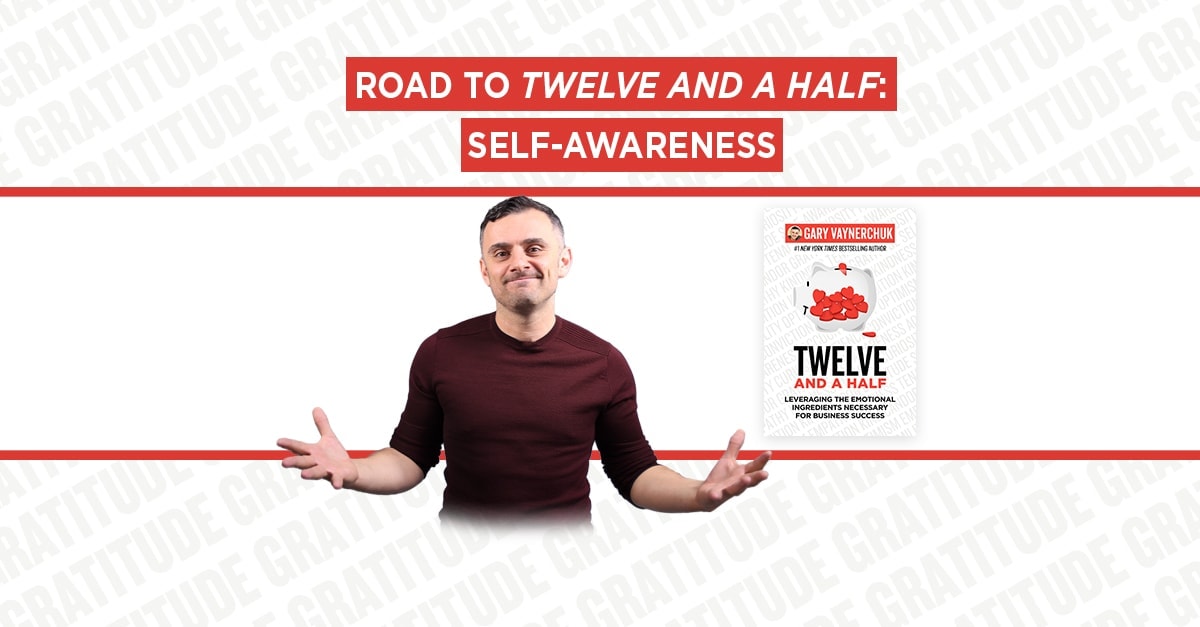Welcome to the second stop on the Road to Twelve and a Half series: self-awareness.
For those of you who didn’t know, Road to Twelve and a Half is a new series I’m doing here on the blog and for my newsletter community leading up to the November 16th release of my upcoming book, Twelve and a Half: Leveraging the Emotional Ingredients Necessary for Business Success. Each week, we’re taking a look into one or two of the traits aka “ingredients” that I think are most important to building a happy and healthy personal and professional life.
Last week, we talked about all things gratitude. Next up, we’re diving into self-awareness.
What is Self-Awareness?
Self-Awareness
(noun)
Conscious knowledge of one’s own character, feelings, motives, and desires.
In addition to the above definition, I think self-awareness is about knowing your strengths, weaknesses, likes, dislikes, the things you’re great at, the things you suck at…Ultimately, it comes down to knowing who you are and how you operate.
All 13 of the traits mentioned in my book are important variables in being successful, but I think self-awareness is one of the top ingredients. Here’s why.
Why Self-Awareness is Important
If you don’t know yourself and you don’t know what you’re good at, you’ve got no shot; you’re gonna be constantly spinning your wheels. The journey to self-awareness is about being willing to be super honest with yourself about who you are, even when nobody’s watching. The problem is, too many people are basing who they want to be off of what friends and family think, a desire for fancy things they think will impress others, or what’s “cool.”
Let me give you an example.
Self-awareness and entrepreneurship
I remember exactly when the value of self-awareness first grabbed my attention. It was back in 2011 to 2013 when the interest in entrepreneurship became widely popular in culture.
More and more students and execs started becoming startup founders, and I was genuinely confused…
To me, it was clear that many of these people were not true entrepreneurs, but then I realized that it wasn’t clear to them. Why? — because they lacked self-awareness.
Many of these people had great ideas or lots of ambition, but that didn’t mean they were true entrepreneurs. I saw a lot of them trying to be number ones – aka CEOs and founders – when in reality, they were really meant to be amazing number twos, threes, and twenty-sevens. This doesn’t come from a place of audacity or me thinking that I’m better than anybody, anger, etc…it comes from empathy. The fact is that “number one spot” within a company is great if you have the DNA for it and if it makes you happy. For example, business is 100% my hobby. I could never give it up because I’m a purebred entrepreneur, but I know this isn’t the case for many others.
Some people talk themselves into starting companies only to realize that they don’t like being at the helm, they don’t like the barrage of “no’s,” they don’t like taking risks. Maybe they’d actually be happy as fuck in another spot within a company, whether that’s number two, four, ten, etc…I think there’s actually an incredible amount of people that are meant to be great number threes and fours who’ve really put themselves into an unhappy framework trying to be entrepreneurs. Please, it’s time for us to have an honest conversation with ourselves about whether we actually enjoy the work of entrepreneurship, or if we’d be happier doing something else. For even more context, watch this clip:
My one hope for all of you reading this is that you develop true self-awareness. Remember, there’s a difference between thinking something is cool and knowing it’s your calling. Self-awareness will help you make the distinction.
Why Self-Awareness is So Hard for People
Self-awareness is about knowing who you are, and when you don’t know who you are, you leave yourself vulnerable to trying to become someone you’re not. Here are a couple of common traps I see people falling into.
1. Delusion
Delusional people lack self-awareness because they’re not being honest with themselves. Ironically, they tend to look critically at what everyone else is doing instead of looking inward and being real about themselves.
Look – I get it. Being honest with ourselves is hard. It’s much easier to be a keyboard warrior or to talk about what everybody else is doing wrong than it is to own up to your own stuff. The issue is that when people don’t look at themselves first, they can end up really overestimating their strengths and underestimating their weaknesses.

When you’re truly self-aware, there’s no room for delusion. You’re honest with yourself about everything, which allows you to triple-down on your strengths and navigate your weaknesses.
2. Overcompensation
This second group of people is not delusional…they actually realize when they suck at something, but they overcompensate for those insecurities by propping themselves up for everyone else to see. These are the folks who put “CEO” in their IG bios to look good in the eyes of the world rather than leaning into their actual strengths and passions.
This group is constantly chasing titles, promotions, and achievements. Ambition is great, but when you’re overly focused on what other people in the organization think about you rather than bringing actual value to your current position, that’s when you’re in trouble.
Titles are valuable when you’re planning to switch jobs or moving to another company altogether, but when I see people obsessed with gaining new titles within their company, I know that they’re more than likely overcompensating for some deeper insecurity around what other people think of them.
How to Build Your Self-Awareness
We’ve established that honesty is key, but let’s go a little further. One of the best ways to increase your self-awareness is by making the people closest to you feel safe enough to tell you the truth about their observations of you. Here are some other tactical ways to get real with yourself and build your self-awareness.
1. Pay attention to what you like
I want you to ask yourself the following questions…
What comes naturally to me?
What do I love doing?
What’s in my DNA?
Answering these questions honestly is a great starting point to increasing self-awareness. More importantly, your answers will help you get closer to what might actually make you happy. With this, it’s important to understand that what you like is what you like. It’s not about manipulating that to fit into whatever’s cool right now or what you think could potentially make you the most money. It’s about really stopping to think what you would do even if no one was looking.
For me, I’ve always had self-awareness around the fact that I’m a purebred businessman. When I was six years-old, I had a six-lemonade stand franchise in Edison, New Jersey. From there it was trading and selling sports cards, garage sailing, my dad’s liquor store, VaynerMedia, VeeFriends…you get the point.
People often ask how I stay so focused or why I’ve never given up, and it’s simple. I know what I love to do and I don’t want to be doing anything else.
2. Pay attention to what you don’t like
On the other hand, it’s equally important to identify the things you hate. Oftentimes, I see people trying to force themselves to enjoy things they just don’t like instead of focusing on their passions. This leads to a crazy amount of self-judgement – which we’ll talk about more later on – and a lot of people end up beating themselves up for being “lazy.”
I actually think that being lazy is a good thing. Ask yourself this…What am I lazy around? Then ask yourself, is it laziness, or am I just showing myself that I actually don’t like this thing? Congratulations — you’ve just found an amazing mechanism toward building self-awareness. To understand how observing the patterns around your laziness can build self-awareness, watch this clip and let it sink in:
If you’re willing to pay attention to your dislikes with curiosity instead of judgement, you’ll learn a lot about yourself.
3. Pay attention to the facts
Lastly, it’s important to remember that your opinion isn’t the only one that matters. While likes and dislikes are important, self-awareness also relies on the truth of your proven track record.
You might think your content is amazing, but if you’ve been posting consistently for years and no one’s engaging, the truth is that it might suck. You might swear your product or service is the best out there, but what is the market saying?
When I made a thousand dollars as a sixth grader selling stuff, I knew I was going to be okay even if I got D’s and F’s in school. Why? It wasn’t just my opinion that I was a talented businessman — I had affirmation from the market.
Remember, self-awareness is about honesty, and honesty and delusion can’t coexist. That means that you can’t base your self-awareness solely on your own opinion of yourself. You also have to pay attention to the feedback and results you’re getting, while not personalizing any criticism you get.
Get Rid of the Judgement
As you build your self-awareness, guess what. You may learn some stuff about yourself that you don’t like. You may realize, oh, I thought I was good at that thing but I’m really not…or, I thought this was what I wanted to do with my life but I actually hate it and I want to do something totally different.
When this happens, it’s so important to realize that self-awareness does not equal self-judgement. Even if you realize you suck at something, you need to let it go. Why? Self-awareness isn’t an excuse to beat up on yourself. In fact, beating up on yourself is a complete waste of time. All it does is slow you down and get in the way of you moving on to starting the thing that’s actually gonna bring you happiness.
“I’m realizing right now that it’s one thing to be self-aware. It’s another thing to look in the mirror and say, ‘Hey, you’re not good at X.’ That doesn’t mean telling yourself you’re a piece of shit. It just means acknowledging a weakness.” – Twelve and a Half: Leveraging the Emotional Ingredients Necessary for Business Success
We all know who we are — sometimes we don’t like that…but we know. The good news is that the opportunities are endless once we stop worrying about what other people think and holding those judgments against ourselves.
It’s not about You vs. Them or even You vs. You. Play life within yourself, be nice to yourself, and understand yourself. The quicker you lean into self-awareness, the quicker you deploy self-love and acceptance and stop buying into the hype of society.
Key Ingredient
There is so much more to say about self-awareness and how it overlaps with other things like confidence, accountability, etc., but I’ve saved the biggest gems for the book. I can’t wait for you all to read it.
How are you liking the series so far? I’d love to hear your thoughts on Twitter using the hashtag #RoadtoTwelveandaHalf.











